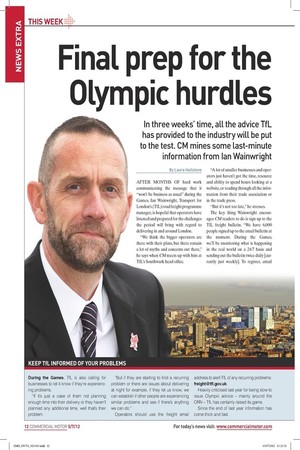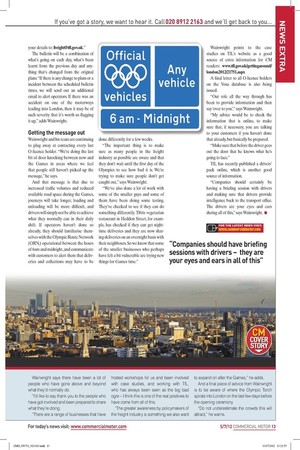Final prep for the Olympic hurdles
Page 8

Page 9

If you've noticed an error in this article please click here to report it so we can fix it.
In three weeks’ time, all the advice TfL has provided to the industry will be put to the test. CM mines some last-minute information from Ian Wainwright
By Laura Hailstone
AFTER MONTHS OF hard work communicating the message that it “won’t be business as usual” during the Games, Ian Wainwright, Transport for London’s (TfL) road freight programme manager, is hopeful that operators have listened and prepared for the challenges the period will bring with regard to delivering in and around London.
“We think the bigger operators are there with their plans, but there remain a lot of myths and concerns out there,” he says when CM meets up with him at TfL’s Southwark head office. “A lot of smaller businesses and operators just haven’t got the time, resource and ability to spend hours looking at a website, or reading through all the information from their trade association or in the trade press.
“But it’s not too late,” he stresses.
The key thing Wainwright encourages CM readers to do is sign up to the TfL freight bulletin. “We have 6,000 people signed up to the email bulletin at the moment. During the Games, we’ll be monitoring what is happening in the real world on a 24/7 basis and sending out the bulletin twice daily [currently just weekly]. To register, email your details to: freight@tfl.gov.uk.” The bulletin will be a combination of what’s going on each day, what’s been learnt from the previous day and anything that’s changed from the original plans. “If there is any change to plans or a incident between the scheduled bulletin times, we will send out an additional email to alert operators. If there was an accident on one of the motorways leading into London, then it may be of such severity that it’s worth us flagging it up,” adds Wainwright.
Getting the message out
Wainwright and his team are continuing to plug away at contacting every last O-licence holder. “We’re doing the last bit of door knocking between now and the Games in areas where we feel that people still haven’t picked up the message,” he says.
And that message is that due to increased traffic volumes and reduced available road space during the Games, journeys will take longer, loading and unloading will be more difficult, and drivers will simply not be able to achieve what they normally can in their daily shift. If operators haven’t done so already, they should familiarise themselves with the Olympic Route Network (ORN,) operational between the hours of 6am and midnight, and communicate with customers to alert them that deliveries and collections may have to be done differently for a few weeks.
“The important thing is to make sure as many people in the freight industry as possible are aware and that they don’t wait until the first day of the Olympics to see how bad it is. We’re trying to make sure people don’t get caught out,” says Wainwright.
“We’ve also done a lot of work with some of the smaller guys and some of them have been doing some testing. They’ve checked to see if they can do something differently. Tibits vegetarian restaurant in Heddon Street, for example, has checked if they can get nighttime deliveries and they are now sharing deliveries on an overnight basis with their neighbours. So we know that some of the smaller businesses who perhaps have felt a bit vulnerable are trying new things for Games time.” Wainwright points to the case studies on TfL’s website as a good source of extra information for CM readers: www.tfl.gov.uk/gettingaround/ london2012/21751.aspx A final letter to all O-licence holders on the Vosa database is also being issued.
“Our role all the way through has been to provide information and then say ‘over to you’ , ” says Wainwright.
“My advice would be to check the information that is online, to make sure that, if necessary, you are talking to your customers if you haven’t done that already, but basically be prepared.
“Make sure that before the driver goes out the door that he knows what he’s going to face.” TfL has recently published a drivers’ pack online, which is another good source of information.
“Companies should certainly be having a briefing session with drivers and making sure that drivers provide intelligence back to the transport office. The drivers are your eyes and ears during all of this,” says Wainwright. ■
KEEP TfL INFORMED OF YOUR PROBLEMS
During the Games, TfL is also calling for businesses to let it know if they’re experiencing problems.
“If it’s just a case of them not planning enough time into their delivery or they haven’t planned any additional time, well that’s their problem. “But if they are starting to find a recurring problem or there are issues about delivering at night for example, if they let us know, we can establish if other people are experiencing similar problems and see if there’s anything we can do.” Operators should use the freight email
address to alert TfL of any recurring problems: freight@tfl.gov.uk.
Heavily criticised last year for being slow to issue Olympic advice – mainly around the ORN – TfL has certainly raised its game.
Since the end of last year information has come thick and fast. Wainwright says there have been a lot of people who have gone above and beyond what they’d normally do.
“I’d like to say thank you to the people who have got involved and been prepared to share what they’re doing.
“There are a range of businesses that have hosted workshops for us and been involved with case studies, and working with TfL, who has always been seen as the big bad ogre – I think this is one of the real positives to have come from all of this.
“The greater awareness by policymakers of the freight industry is something we also want to expand on after the Games,” he adds.
And a final piece of advice from Wainwright is to be aware of where the Olympic Torch spirals into London on the last few days before the opening ceremony.
“Do not underestimate the crowds this will attract,” he warns.










































